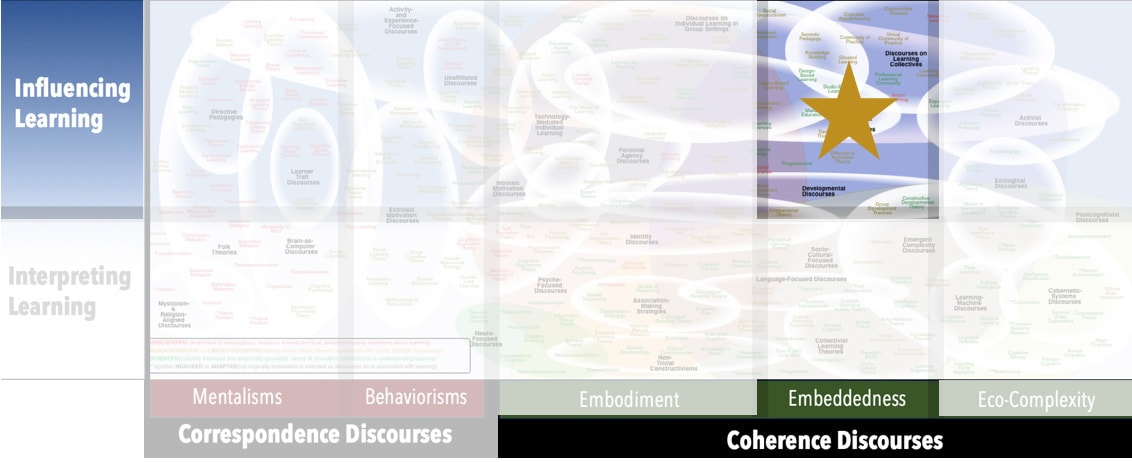Focus
Self-maintenance of an expertise-based collectivePrincipal Metaphors
- Knowledge is … sum of situation-relevant expertise
- Knowing is … social co-participation
- Learner is … an apprentice (individual) in/and an occupation (collective)
- Learning is … apprenticing
- Teaching is … mentoring
Originated
1990sSynopsis
A Community of Practice (CoP) is a group of active practitioners of an occupation that (1) involves expertise (i.e., learned and practiced skills and/or knowledge) and (2) has processes for sharing information and sequencing experiences in ways that afford members opportunities to develop personally and professionally. Relevant constructs and associated discourses include:- Body of Knowledge (Etienne and Beverly Wenger-Trayner, 2010s) – as used within Community of Practice, the ideas and activities that define a profession – as endorsed, mandated, and monitored by learned societies and/or professional associations
- Distributed Leadership (James Spillane, 2000s) – a discourse developed to study school leadership by attending to actions and tasks that are distributed across the organization (rather than focusing on an administrator or the context)
- Duality (Etienne and Beverly Wenger-Trayner, 2010s) – as used within Community of Practice, a non-dichotomous tension that prompts meaningful engagement. Examples include the participation–reification, the designed–emergent, the identification–negotiability, and the local–global dualities.
- Landscape of Practice (Etienne and Beverly Wenger-Trayner, 2010s) – those Communities of Practice that share the same Body of Knowledge
Commentary
See Situated Learning.Authors and/or Prominent Influences
Jean Lave; Etienne WengerStatus as a Theory of Learning
CoP is not a theory of learning. It is, rather, an elaboration of one aspect of Situated Learning.Status as a Theory of Teaching
While the discourse surrounding CoP is more descriptive than prescriptive, it does offer advice that could be considered pedagogical in nature, especially around group dynamics, formal and informal processes, and strategies for formatting inductions (such as apprenticeships).Status as a Scientific Theory
By virtue of its affiliation with Situated Cognition, CoP meets some of the requirements of a scientific theory. However, because it is more descriptive than prescriptive, it is difficult concept to “test” or prove.Subdiscourses:
- Body of Knowledge
- Distributed Leadership
- Duality
- Landscape of Practice
Map Location

Please cite this article as:
Davis, B., & Francis, K. (2021). “Community of Practice” in Discourses on Learning in Education. https://learningdiscourses.com.
⇦ Back to Map
⇦ Back to List
